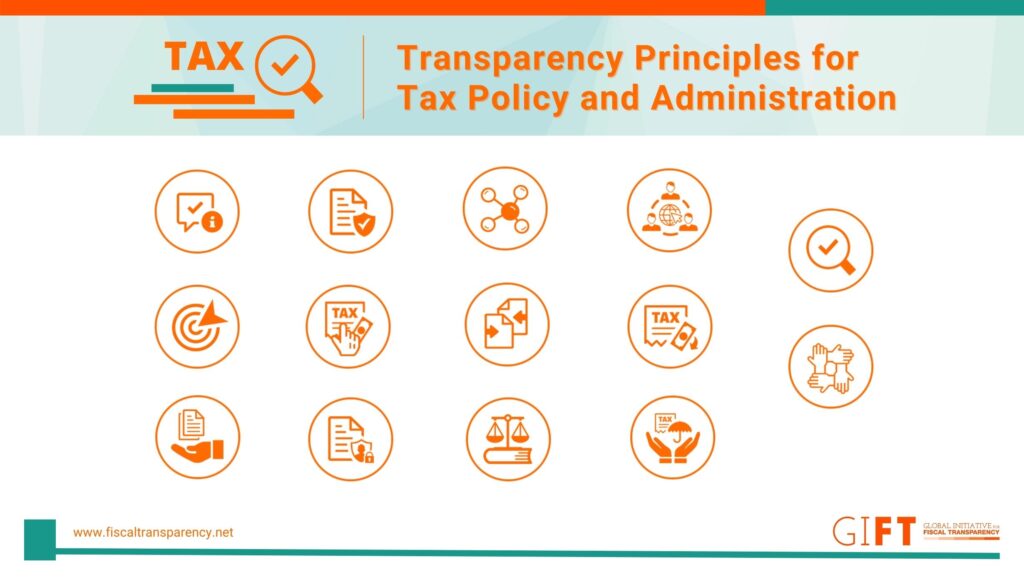Developing and Using
Global Tax Transparency Principles
The Rationale and the Process
by Andrew Baker, Richard Murphy, Raquel Ferreira, Juan Pablo Guerrero
This blog is also published by the International Monetary Fund (IMF) here.

On August 2nd 2022 a new set of Transparency Principles for Tax Policy and Administration was approved by the General Assembly of the Global Initiative for Fiscal Transparency (GIFT) in Bogotá, Colombia. This initiative is part of GIFT’s work on advancing norms, which includes the High-Level Principles on Fiscal Transparency, Participation and Accountability in 2012 and Principles of Public Participation in Fiscal Policy in 2016. The new Principles seek to fill a gap in the global architecture of fiscal transparency rules and to provide a robust but flexible reference point for policy makers and stakeholders to develop their own frameworks for taxation.
The newly adopted Principles are a response to the growing importance of taxation in international development debates. They were developed with support from the World Bank’s Global Tax Program and the International Budget Partnership’s Tax Equity Initiative. GIFT first commissioned a set of documents including Making Tax Work; a brief on the role of international principles and standards; and a GIFT/IBP scoping study, providing a civil society perspective on taxes. The Principles grew out of Making Tax Work and their publication has followed a year-long round of public consultations involving the OECD, the IMF and World Bank, national authorities and civil society organisations in several countries.
The Purpose, Function and Form of the Principles
The Principles are informed by a major World Bank study showing that transparency builds trust in tax systems, enhances tax morale, and increases revenue. Tax morale however goes beyond mere simple willingness to pay tax. It encompasses confidence in and awareness of a tax system’s capacity to serve public interests and achieve a broad range of public policy goals. The Principles promote institutional mechanisms and information sources that will help societies reflect on how to build and invest in their tax systems as effective instruments for meeting pressing challenges such as sustainable prosperity, climate change, mitigating inequality and maintaining vital public services.
The focus of the Principles is on enhancing transparency in the management of national tax systems. Transparency in this reading is about publishing the quantitative and qualitative data that a society needs to hold decision makers to account and to reach informed judgements on how well the system is performing. This is a broader though complementary definition to the prevailing OECD definition, which sees tax transparency primarily as a means of tackling bank secrecy and tax evasion – covered in Principle 10 on fulfilling international commitments, including Automatic Information Exchange.
Tax transparency as promoted by the Principles involves an annual information cycle covering all stages of the taxation process from the setting of objectives, to forecasts of projected revenues, to policy decisions on rates and specific design elements (e.g., reliefs and exemptions), to the collection and recovery of taxes due, to the payment, settlement, holding and distribution of taxes, and finally to an assessment of the system’s overall performance.
The Uses of the Principles
The Principles are intended to act as a benchmark for informing discussions within a country and with the international community about tax system performance. They are written at a sufficient level of generality to enable them to be applied to a country’s specific economic, legal, administrative, and cultural arrangements. They do not aim at detailed prescriptions for national legislation but provide a robust and flexible reference point for policy makers and stakeholders to develop their own frameworks for taxation. Like all principles they should be evolutionary and will need to be reviewed periodically in the light of circumstances to maintain their usefulness as an instrument for policy making.
The Principles cover four levels of transparency: basic; intermediate; advanced; and aspirational. These levels are intended to increase degrees of transparency over time, reflecting an escalating scale of ambition. Thus, governments might first aim to meet the basic and intermediate levels before progressing to advanced and aspirational levels.
Ultimately, taxing people is one of a government’s most significant powers. Providing transparent data on why tax is charged, on whom it is charged, how much is paid and with what outcomes is fundamental to public debate on fiscal policy, economics, and social policy. The challenge now is to apply the Principles.
Governments will, we hope, be able to use the Principles to help achieve their policy goals and improve tax system performance. International organisations, including the OECD, the IMF and the World Bank can use the Principles to appraise the tax systems of countries, to promote accountability, raise tax morale and improve macroeconomic management. Civil society can use the Principles to argue for tax policies their communities want. Crucially, the Principles have been deliberately written to facilitate their use by these different groups. GIFT encourages feedback from stakeholders on their experiences in applying them.
